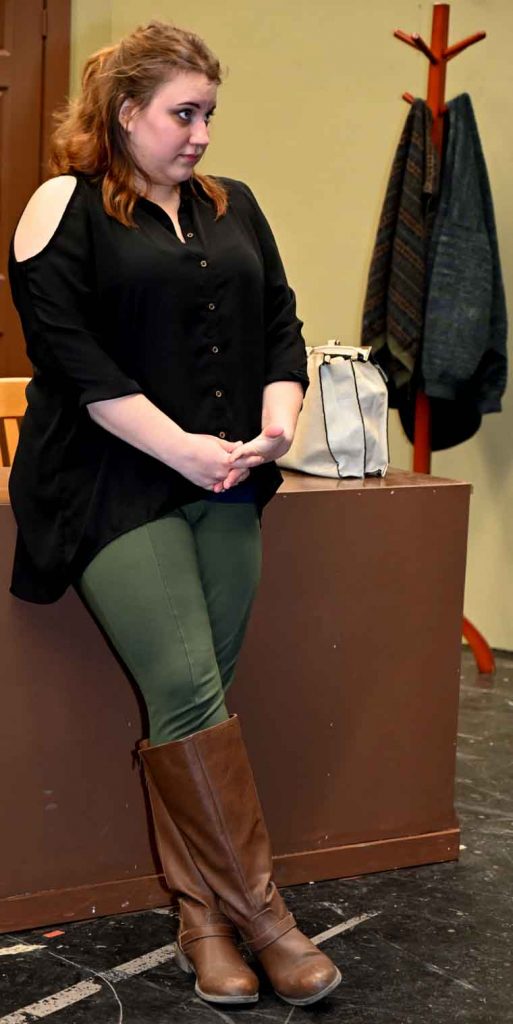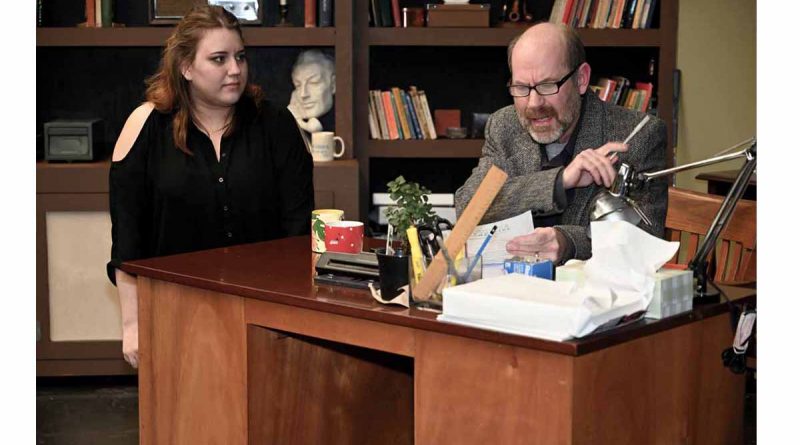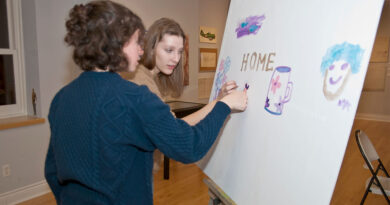Repeat After Me, Today I Learned
By John Swartz
Educating Rita is not simply the Pygmalion variation it seems on the surface. Mariposa Arts Theatre is doing it this week at their Brammer Drive warehouse, which itself is not descriptive of what the building is, workshop, rehearsal hall and lately a theater.
Essentially this old tale, upper class male takes lower class female and makes something of her, is supposed to show how even a dumb person can acquire culture, with the side affect the teacher learns a thing or two. In Educating Rita the tag along story is about the expectations of formalized education and what is it really teaching, and how one’s peers – back in the neighbourhood – can turn on you when you get too smart.
Rita (Rachel DeChamplain) has enrolled in Open University (a concept and a real school) and Frank (Robert Knapp) is her tutor. He doesn’t want to be tutor but is being forced to. He tells her he has nothing to teach and has nothing she needs to learn from him, so go away. She doesn’t know any better, she’s supposed to be there so she’s showing up.

By the end of Act One he’s changed his mind a bit and when she hesitates about continuing, he wants to stick with it because of the promise she shows. It’s a struggle getting to that point. He has more bottles stashed about his rather large office, for a university tutor, than a hoarder has piles of newspapers, but he does know the system. His advice to Rita is, the best way to advance is learn how to answer questions the university way, even though Rita’s more direct, to the point way is better.
For example her answer to how to get around staging issues in Ibsen’s Peer Gynt is to “do it on the radio,” which is perfectly logical, but not the expected answer. He sees the danger in that, losing one’s identity and perspective, which in fact happens to Rita.

She gets far enough along, her husband and other people around her are suspicious of what she’s learning (more like why?) and the relationship between teacher and student. It’s confusing, she doesn’t’ know where she belongs, the place she aiming to be she’s not ready for and she believes those people know it, and she’s not really different from the old crowd just because she learned some loftier ideas, but she is different.
Frank starts to understand learning what the system wants you to learn has a conforming affect on individuals verses learning the real meaning of tragedy as a literary construct is, and learning live theater often is not alive (a risky line for a playwright to give a character). When Rita comes to an appointment presenting a refined version of herself, and educated version, he is horrified and wants her to drop the act.
The rest of the play is Frank struggling to help Rita learn the material, without losing the thing that makes her Rita. He’s also struggling to come to terms with his own wasted talent, how to live with himself because of that, and how to resurrect some amount of self dignity.
That’s a lot to unpack from a comedy. Willy Russell wrote a witty play, though there there are some moments to laugh out loud. Whether the amount of spontaneous laughter could have been greater with different delivery of lines (it usually can be just by slowing down) or whether Russell was using humour to stamp space in the mind for an observation about human intellectual growth is hard to tell, but he surely made at least one audience member think a little more deeply about what it means to be educated – to who’s standard? The teacher’s or the student’s desire.
If you go to the play (Thursday, Friday, Saturday evenings, or Sunday afternoon) don’t be surprised if you go away thinking about things, after you’ve had a chuckle or two. The Opera House box office has the tickets.
(Photos Supplied by Mike Beresford)
![]()



![]()




